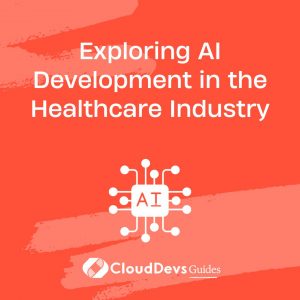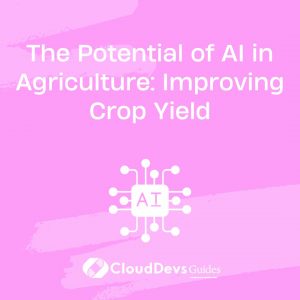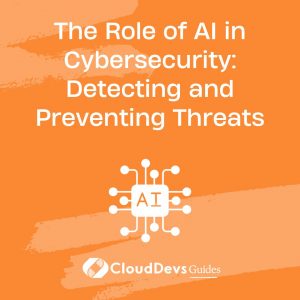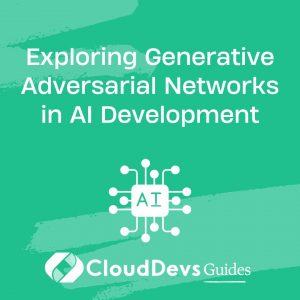Exploring AI Development in the Healthcare Industry
The healthcare industry has been rapidly evolving over the past few decades, and one of the most groundbreaking and promising advancements is the integration of Artificial Intelligence (AI) into various aspects of healthcare. AI has the potential to revolutionize how healthcare is delivered, from improving diagnostic accuracy to enhancing patient outcomes and streamlining administrative tasks. In this blog post, we will delve into the world of AI development in the healthcare industry, exploring its applications, benefits, challenges, and potential future directions.

1. Introduction
1.1. The Convergence of AI and Healthcare
The healthcare industry has traditionally relied on the expertise of medical professionals, extensive data analysis, and labor-intensive administrative processes. With the rise of AI technologies, however, healthcare is undergoing a transformation that promises to make diagnosis and treatment more accurate, accessible, and efficient than ever before. AI techniques like machine learning and natural language processing are being leveraged to process vast amounts of medical data and derive valuable insights.
2. Applications of AI in Healthcare
2.1. Diagnostic Assistance
One of the most impactful applications of AI in healthcare is diagnostic assistance. AI-powered algorithms can analyze medical images, such as X-rays, MRIs, and CT scans, to identify patterns and anomalies that may be imperceptible to the human eye. This technology has the potential to improve early detection of diseases like cancer, enabling timely intervention and potentially saving lives.
2.2. Personalized Treatment
AI is also being employed to develop personalized treatment plans for patients. By analyzing a patient’s medical history, genetic information, and real-time health data, AI algorithms can recommend tailored treatment options. This approach can lead to more effective and efficient interventions, reducing the need for trial-and-error treatments.
2.3. Drug Discovery and Development
The drug discovery process is notorious for being time-consuming and costly. AI is changing this landscape by accelerating drug discovery through predictive modeling. AI algorithms analyze vast datasets to identify potential drug candidates, predict their effectiveness, and optimize molecular structures. This not only reduces the time required for drug development but also increases the chances of finding successful candidates.
2.4. Administrative Efficiency
Beyond clinical applications, AI is streamlining administrative tasks in healthcare institutions. Chatbots and virtual assistants powered by AI are handling appointment scheduling, answering patient queries, and even assisting with medical coding and billing. This automation allows healthcare professionals to focus more on patient care and less on administrative burdens.
3. Benefits of AI in Healthcare
3.1. Improved Diagnosis Accuracy
One of the primary benefits of AI in healthcare is the potential to enhance diagnostic accuracy. AI algorithms can analyze medical images with a level of precision that can aid medical professionals in identifying subtle abnormalities. This can significantly reduce the rate of misdiagnoses and improve patient outcomes.
3.2. Enhanced Patient Outcomes
Personalized treatment plans based on AI analysis can lead to better patient outcomes. By tailoring interventions to individual patients, healthcare providers can achieve higher success rates in treatment, reduced side effects, and shorter recovery times. This patient-centric approach has the potential to revolutionize the way healthcare is delivered.
3.3. Efficient Data Management
The healthcare industry generates massive amounts of data on a daily basis. AI tools can efficiently manage and analyze this data, uncovering patterns and insights that may have otherwise gone unnoticed. This data-driven approach can inform medical research, public health initiatives, and clinical decision-making.
4. Challenges and Considerations
4.1. Data Privacy and Security
The utilization of AI in healthcare raises concerns about patient data privacy and security. The sensitive nature of medical information requires robust measures to protect patient confidentiality and comply with data protection regulations, such as HIPAA in the United States.
4.2. Regulatory Hurdles
The integration of AI technologies into healthcare is subject to regulatory approval. Ensuring that AI algorithms meet rigorous standards for safety and efficacy is essential. Regulatory agencies need to strike a balance between promoting innovation and safeguarding patient well-being.
4.3. Integration with Clinical Workflows
To maximize the benefits of AI, seamless integration with existing clinical workflows is crucial. Healthcare professionals need user-friendly interfaces that allow them to interpret AI-generated insights and recommendations effectively. A lack of integration could hinder the adoption of AI solutions in real-world medical settings.
5. The Future of AI in Healthcare
5.1. AI-powered Telemedicine
Telemedicine, already on the rise, stands to benefit immensely from AI advancements. AI can enhance remote patient monitoring, enable more accurate virtual diagnoses, and even assist in robotic-assisted surgeries conducted from a distance.
5.2. Predictive Analytics for Disease Prevention
AI’s predictive capabilities can be leveraged to identify individuals at risk of certain diseases before symptoms manifest. This proactive approach to healthcare can lead to earlier interventions and more effective disease prevention strategies.
5.3. Robotic Surgery
Robotic surgery, guided by AI algorithms, is becoming increasingly sophisticated. These robots can offer unprecedented precision and dexterity, allowing surgeons to perform complex procedures with minimal invasiveness. This results in shorter recovery times and improved surgical outcomes.
6. Code Sample: Machine Learning for Diagnostics
python
# Importing necessary libraries
import numpy as np
import pandas as pd
from sklearn.model_selection import train_test_split
from sklearn.linear_model import LogisticRegression
from sklearn.metrics import accuracy_score
# Loading and preprocessing medical data
data = pd.read_csv('medical_data.csv')
X = data.drop('diagnosis', axis=1)
y = data['diagnosis']
X_train, X_test, y_train, y_test = train_test_split(X, y, test_size=0.2, random_state=42)
# Building a diagnostic model
model = LogisticRegression()
model.fit(X_train, y_train)
# Making predictions
y_pred = model.predict(X_test)
# Calculating accuracy
accuracy = accuracy_score(y_test, y_pred)
print('Diagnostic Model Accuracy:', accuracy)
Conclusion
The integration of AI into the healthcare industry holds immense promise for transforming the way medical services are delivered, diagnoses are made, and treatments are personalized. From aiding in early disease detection to expediting drug discovery, AI is reshaping healthcare across multiple dimensions. However, alongside its benefits come challenges related to data security, regulation, and seamless integration into clinical workflows. As AI continues to advance, collaborations between AI experts, medical professionals, and regulatory bodies will be crucial to harness its full potential and ensure a healthier and more connected future for all.
In this ever-evolving landscape, the marriage of AI and healthcare represents a milestone in the history of medicine, offering a glimpse into a future where technology collaborates seamlessly with human expertise to improve patient outcomes and redefine the healthcare experience.
Table of Contents









